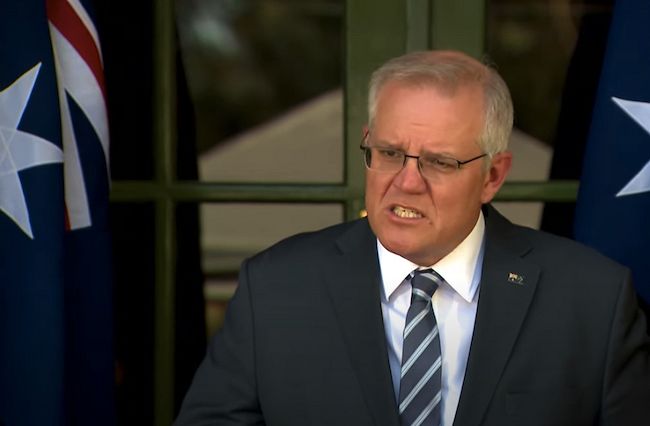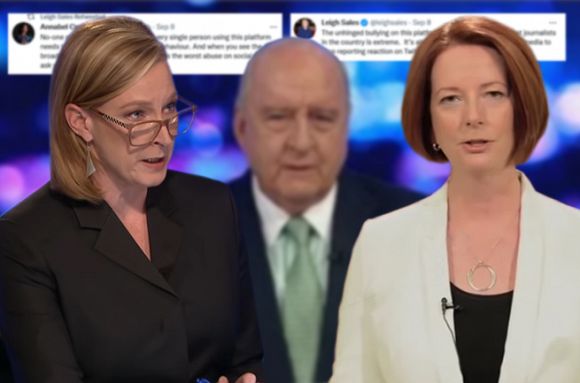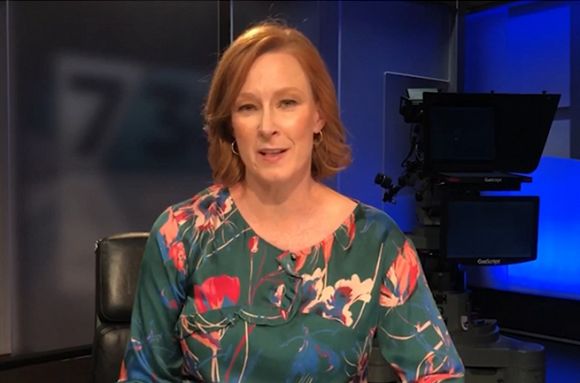Once again politicians and journalists are talking up the bad side of social media and threatening to police our Twitter identities. However, as Dr Martin Hirst argues, this is just another attack on our right to political speech.
NOBODY SHOULD be surprised that Scott Morrison chose this week to launch a broadside at social media in general and Twitter in particular. Without a shred of irony, the Prime Minister labelled Twitter a “coward’s palace” and hinted that the Federal Government would consider legislating mandatory identification of social media users.
You might not have heard “coward’s palace” before; the usual phrase is “coward’s castle,” but that term is reserved for parliamentary chambers where elected members can mouth off in the most defamatory terms hiding behind the cloak of “privilege”.
Morrison could hardly afford to use the same term, so it would seem his advisors invented him a new one:
"Cowards who go anonymously onto social media and vilify people and harass them and bully them, and engage in defamatory statements, they need to be responsible for what they're saying."
As I said, not a hint of irony in the PM’s words:
"I can't come out here and you can't come here and start doing things like that … we're responsible for the things we say and do."
We know that Scott Morrison doesn’t take responsibility for anything except making announcements that he knows the faithful stenographers in the press gallery will record, amplify and pontificate on. This week Morrison is channelling the recent cycle of outrage kicked off by certain blue-tick journalists who hate it when Twitter talks back.
Of course, you realise it was a complete coincidence that Morrison made his remarks in the same week that his defence minister was in court, part-way through his defamation proceedings against a refugee activist who described Peter Dutton as a “rape apologist” in a since-deleted tweet.
Shane Bazzi has raised donations to defend his suit. His lawyers told the Federal Court that Mr Bazzi’s view of the minister as a “rape apologist” was an "honestly-held opinion”.
But Shane’s opinion is not the kind of political speech that either Mr Morrison or Mr Dutton consider worth defending.
There’s no irony either in a leading government figure descending from coward’s castle to thug a citizen who had the temerity to express an unflattering view of him via social media. Mr Dutton is – as we might expect – a paragon of rectitude and virtue when it comes to social media. He never gets down in the Twitter sewer — or is it a cesspit?
Well, let’s see.
This week there was also another round of the seemingly endless “Twitter-is-garbage” outrage from entitled professionals who like to offer their views unopposed and hate being challenged on their bad takes.
This week’s cycle of whinging was kicked off by (hardly new) revelations that the 46th Premier of NSW has strong links to the secretive Catholic sect, Opus Dei, as well as being a climate denialist, a far-right Trump-supporting libertarian and an opponent of marriage equality.
“Don’t criticise his religion” was the cry from several prominent figures, including newly-minted "New Liberal" Alex Turnbull and surgeon Dr Stephen Parnis. There were others too, who felt that Dominic Perrottet’s religious beliefs were “personal” and off limits from political critique.
Well, such sentiments are rubbish as academic and psychotherapist Dr Jennifer Wilson pointed out to Independent Australia readers recently:
It will be again argued that a politician’s faith is a private matter, usually by privileged men who, unlike women, are unaffected by the religious compulsion to control us and to control individual sexuality. Religious legislators invariably seek to introduce laws that restrict women’s rights and block reforms that guarantee them. Women well know the precarious nature of the gains we have made and how quickly we can lose them.
If we are to be governed by men and women who seek to control our most intimate decisions in the name of their god, we have every right to know this and anyone who argues otherwise must be regarded as hostile to women.
However, these privileged men – immune as they are to reasonable argument that doesn’t accord with their world view – got very upset when their jaundiced takes were challenged, particularly by articulate and angry women as this exchange between Stephen Parnis and Ronni Salt illustrates.
Dr Parnis – who, it’s been pointed out, has been a useful source of information on the pandemic – then took his bat and went home. Or as he put it, he was leaving the 'cesspit' behind.
It is exchanges like this – and the recent Leigh Sales’ commentary about Twitter 'bullies' – that prompted Morrison’s threat to make social media companies take 100 points of identification and for individuals to identify themselves on social channels, and not cloak their accounts in anonymity. But don’t be too alarmed, true to form, this is just a re-announcement of an announcement made in April this year.
Same circus – new clowns
If this all sounds a bit familiar, that’s because it is. We’ve been to this circus and the clowns are no funnier this time ‘round. Gaven Morris, head of ABC news and current affairs, recently announced he was quitting the national broadcaster, and – guess what – took a swipe at Twitter on his way out the door.
Morris said :
“Social media has become, is a really awful, toxic, unregulated place where nasty people have free fettered access to say whatever they want, without any consequence. It’s been demeaning to journalism, it’s been demeaning to the quality of public discussion.”
Reading about these repetitive and pointless complaints is getting boring and we’ve heard them all before. I’m sure you’ll remember that time, back in March, when Channel Nine/Fairfax journalist Phil Coorey referred to Twitter as a 'sewer' because people had exposed former Attorney-General Christian Porter’s alleged rape. And Nine Network's Chris Uhlmann then described people on Twitter as 'sewer rats'.
This is the go-to response for people who don’t like the feedback they get on a social media platform that is (yep, you guessed it) primarily designed for the exchange of robust debate and strong opinions.
We’ve seen this taken to an extreme recently with the host of 7.30 on the ABC, Leigh Sales, complaining – at length – about abuse from allegedly progressive and left-wing Twitterati, but without providing any real evidence. It turns out that even by a generous measure less than ten per cent of replies and comments directed at Leigh Sales could be considered abusive — yet she claimed that 'hourly' she was subject to a torrent of filth.
In fact, as I demonstrated in this rebuttal piece in IA, global research shows that the vast bulk of abuse and threats directed at journalists is from far-Right actors, who often have the backing of powerful conservative politicians.
My point is that I don’t think that the insulting comparison between Twitter and either a cesspit or a sewer is an apt one for these esteemed blue ticks to be making. Their real target is to shut down uncontrollable political speech that makes them uncomfortable.
Twitter is not a sewer, but it is both the present and the future of the news ecosystem. The sooner everyone realises this and learns to live with it, the better.
I think Dr Victoria Fielding (nee Rollison) made this point very well on – yep, that’s right – Twitter.
I don’t think it’s fair or reasonable that Twitter is characterised as either a “coward’s palace”, a “sewer” or a “cesspit”. This doesn’t mean that I deny the existence of abuse and trolls on Twitter. There’s certainly racist abuse and misogynistic trolling of women. But those who engage in such behaviour are in the minority and – let’s be clear – most of the abuse comes from the conservative side of politics.
Appalling oafs like MPs Craig Kelly and George Christensen give advice and comfort to these – invariably anonymous – Right-wing trolls. There’s also no doubt that it is conservatives who mobilise bot armies to swarm Twitter with their Right-wing messaging of misinformation and conspiracy theories.
It also needs to be said that people may have a good reason to be anonymous on social media. For example, women wanting to leave abusive relationships, people who are worried about their employer taking action against them for tweeting about politics and so on.
Twitter is now an established part of the media ecosphere and it is a space where we can talk to each other about news and current affairs. As others have pointed out, Twitter is often across a story before it gets into the mainstream and social media users are quick to point out mistakes or bias in the coverage that comes out of mainstream news organisations.
This is the true value of social media; it opens up the news conversation and this is what government and journalists don’t like. We have crashed their party; we’re loud; we swear a bit and we get up in their faces.
However, this is the nature of political speech. The one thing that politicians hate – along with their media cheer squad – is being held to account for their words and their actions. They hate that we use social media to call out their lies and deceit.
In fact, they hate it so much that outgoing-ABC news boss Gaven Morris is encouraging journalists to quit the platform.
Said Morris:
“I increasingly have told people at ABC News that I certainly don’t want them on there for their job. I’d have no problem if they choose to be there, personally, but we don’t need journalists to be on Twitter or to be on social media as part of their job.”
He’s fudging of course. The ABC – and all media – need the engagement, but they like it better when we keep quiet.
Dr Martin Hirst is an Independent Australia columnist, a journalist, author and academic. You can follow him on Twitter @ethicalmartini.
Related Articles
- Morrison's AUKUS deal crippling foreign policy
- Under Morrison, Australia strives to be unincorporated territory of U.S.
- Wren's Week: Scott Morrison is destroying Australia's future inside and out
- BOOK REVIEW: The Accidental Prime Minister by Annika Smethurst
- CARTOONS: Mark David does diplomacy
 This work is licensed under a Creative Commons Attribution-NonCommercial-NoDerivs 3.0 Australia License
This work is licensed under a Creative Commons Attribution-NonCommercial-NoDerivs 3.0 Australia License
Support independent journalism Subscribe to IA.














